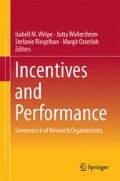Abstract
In recent years, a movement has emerged, which assembles itself under the umbrella term “Open Science”. Its intent is to make academic research more transparent, collaborative, accessible, and efficient. In the present article, we examine the origins, various forms, and understandings of this movement. Furthermore, we put the aims of individual groups associated with Open Science and the academic realities of their concepts into context. We discuss that much of what is known as Open Science can be viewed through the prism of a social dilemma. From this perspective, we explain why the concept of Open Science finds a lot of support in theory, yet struggles in practice. We conclude the article with suggestions on how to foster more Open Science in practice and how to overcome the obstacles it is currently facing.
Access this chapter
Tax calculation will be finalised at checkout
Purchases are for personal use only
References
Bartling S, Friesike S (2014) Towards another scientific revolution. In: Bartling S, Friesike S (eds) Opening science: the evolving guide on how the internet is changing research, collaboration and scholarly publishing. Springer, Cham, pp 3–15
Benson DA, Karsch-Mizrachi I, Lipman DJ, Ostell J (2007) GenBank. Nucleic Acids Res 36(suppl 1):D25–D30
Berners-Lee T (1989) Information management: a proposal. http://www.w3.org/History/1989/proposal.html. Accessed 20 June 2014
Binswanger M (2014) Excellence by nonsense: the competition for publications. In: Bartling S, Friesike S (eds) Opening science: the evolving guide on how the internet is changing research, collaboration and scholarly publishing. Springer, Cham, pp 49–72
Björk B-C, Solomon D (2013) The publishing delay in scholarly peer-reviewed journals. J Inform 7(4):914–923
Boulton G, Rawlins M, Vallance P, Walport M (2011) Science as a public enterprise: the case for open data. Lancet 377(9778):1633–1635
Cranshaw J, Kittur A (2011) The polymath project: lessons from a successful online collaboration in mathematics. In: CHI’11 proceedings of the SIGCHI conference on human factors in computing systems, Vancouver, pp 1865–1874
Cribb J, Sari T (2010) Open science: sharing knowledge in the global century. Csiro, Collingwood
European Commission (2008) Open access in FP7. http://ec.europa.eu/research/science-society/index.cfm?fuseaction=public.topic&id=1300. Accessed 20 June 2014
European Commission (2012) Scientific data: open access to research results will boost Europe’s innovation capacity. http://europa.eu/rapid/press-release_IP-12-790_en.htm. Accessed 20 June 2014
Fecher B, Friesike S (2014) Open Science: one term, five schools of thought. In: Bartling S, Friesike S (eds) Opening science: the evolving guide on how the internet is changing research, collaboration and scholarly publishing. Springer, Heidelberg, pp 17–47
Fecher B, Friesike S, Hebing M (2014) What drives academic data sharing? SOEPpapers on Multidisciplinary Panel Data Research, No. 655, Berlin
Franzoni C, Sauermann H (2014) Crowd science: the organization of scientific research in open collaborative projects. Res Policy 43(1):1–20
Gowers T, Nielsen M (2009) Massively collaborative mathematics. Nature 461(7266):879–881
Hand E (2010) Citizen science: people power. Nature 466(7307):685–687
Kollock P (1998) Social dilemmas. The anatomy of cooperation. Annu Rev Sociol 24(1):183–214
McCullough BD (2009) Open access economics journals and the market for reproducible economic research. Econ Anal Poli 39:118–126
Meyer ET, Schroeder R (2013) Digital transformation of scholarship and knowledge. In: Dutton WH (ed) The Oxford handbook of internet studies. Oxford University Press, Oxford, pp 307–327
Nature (2006) Overview: nature’s peer review trial. http://www.nature.com/nature/peerreview/debate/nature05535.html. Accessed 20 June 2014
Neill US (2008) Publish or perish, but at what cost? J Clin Investig 118(7):2368
Nielsen M (2011) Definitions of open science? Okfn mailing list. https://lists.okfn.org/pipermail/open-science/2011-July/000907.html. 28 July 2011
Nielsen MA (2012) Reinventing discovery: the new era of networked science. Princeton University Press, Princeton
NIH (2003) NIH posts research data sharing policy. Anthropol News 44:25
Piwowar HA (2011) Who shares? Who doesn’t? Factors associated with openly archiving raw research data. PLoS ONE 6:e18657
Polymath DHJ (2010) Desity Hales-Jewett and Moser numbers. In: Bárány I, Solymosi J, Sági G (eds) An irregular mind, vol 21, Bolyai society mathematical studies. Springer, Cham
Polymath DHJ (2012) A new proof of the density Hales-Jewett theorem. Ann Math 175(3):1283–1327
Priem J, Taraborelli D, Groth P, Neylon C (2010) Altmetrics: a manifesto. http://altmetrics.org/manifesto/. Accessed 20 June 2014
Rufai R, Gul S, Shah TA (2012) Open access journals in library and information science: the story so far. Trends Inform Manag 7(2)
Stodden V (2009) The legal framework for reproducible scientific research: licensing and copyright. Comput Sci Eng 11(1):35–40
Weller K (2015) Social media and altmetrics: an overview of current alternative approaches to measuring scholarly impact. In: Welpe IM, Wollersheim J, Ringelhan S, Osterloh M (eds) Incentives and performance – governance of research organizations. Springer, Cham
Weller K, Puschmann C (2011) Twitter for scientific communication: how can citations/references be identified and measured? In: Proceedings of the ACM WebSci’11. ACM, Koblenz, pp 1–4
WU Wien (2014) Prämien für Top-Journal-Artikel. http://www.wu.ac.at/academicstaff/awards/publication. Accessed 20 June 2014
Woelfle M, Olliaro P, Todd MH (2011) Open science is a research accelerator. Nat Chem 3:745–748
Author information
Authors and Affiliations
Corresponding author
Editor information
Editors and Affiliations
Rights and permissions
Copyright information
© 2015 Springer International Publishing Switzerland
About this chapter
Cite this chapter
Friesike, S., Schildhauer, T. (2015). Open Science: Many Good Resolutions, Very Few Incentives, Yet. In: Welpe, I., Wollersheim, J., Ringelhan, S., Osterloh, M. (eds) Incentives and Performance. Springer, Cham. https://doi.org/10.1007/978-3-319-09785-5_17
Download citation
DOI: https://doi.org/10.1007/978-3-319-09785-5_17
Published:
Publisher Name: Springer, Cham
Print ISBN: 978-3-319-09784-8
Online ISBN: 978-3-319-09785-5
eBook Packages: Business and EconomicsBusiness and Management (R0)

